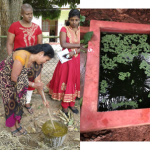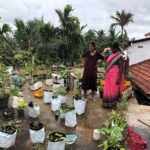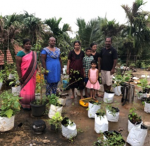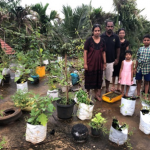The Coronavirus pandemic and its disastrous spread with no known solution is adding stress to most of our lives right now, but spending the time doing some gardening at home helps us not just to maintain sanity, but also as a source of our own food during this uncertain period, is a perfect way to turn anxiety and boredom into calm productivity.
Caritas Sri Lanka (CSL) started implementing the new Food Security Program, “Addressing causes for poverty and ensuring Food Security for Farming Communities“ in Sri Lanka through its 13 Caritas DC network covering all the 25 districts under the leadership of Rev. Fr. Mahendra Gunathilleke, National Director since January 2018 contributing to the UN Sustainable Development Goals (SDG 7 ) and also falling in line with Pope Francis’ Encyclical ‘Laudato Si” – ‘Caring for Our Common Home’ – by introducing chemical-free organic farming with the support from Caritas Norway and NORAD.
Success Story: I am Krishnakumar Pathmeswary, NIC No. 796292920V, GN division –J/119 and having six members in my family. Last year I was the treasurer in the Community Based Organization (CBO) established with the help of Caritas HUDEC Jaffna.
I received the training in organic farming through the Food Security Program organised for farming communities in Sri Lanka implemented by the Caritas HUDEC, Jaffna. They started implementing this program since January 2018 and I got the opportunity to join this program in year 2019.
I learnt about how to establish a home garden through training given by Caritas HUDEC food security staff and got experience to do the farming practices satisfactorily. My home garden is located on the 1st floor in my house as I don’t have land space in my Home. Beetroot, Cabbage, Salad, Onion, Chillies, Brinjal and Tomatoes are planted in bags and the produce is used for my daily needs to prepare meals at home. I am using decomposed Animal Manure, Top Soil, Coir dust/semi – burnt Paddy husk as planting medium and Bags or Planting containers (45c.m X 20c.m) to plant the vegetables. I fill above 1:1 Mixture into a 45c.m X 20c.m bag up to 30c.m. then irrigate the bag and keep in a shady area. Finally, we transfer the seedlings to the prepared bag and continue watering daily. (Seedlings are produced using nursery beds/margarine or ice-cream cups / Banana leaves and other biodegradable material. The mixture is adequate to the plant for 2 1/2 – 3 months as organic manure. Thereafter, liquid fertilizers are used to provide nutrients.
Acclimatization is the process of a Seedling / Plant becoming accustomed to a new climate or to new conditions. Therefore, 10 days before transplanting the seedlings to bags, following steps are used by us: 1) Gradually reduce the shady condition; 2) Gradually increases the watering interval; and 3) increase the amount of sunlight to the plants.
Potted Agriculture is very important because it provides us with the partial household requirement of vegetables, needs less land area, enable us to consume healthy vegetables, creates a beautiful environment, easy to maintain, efficient use of water, usage of bio-degradable wastes and also time-saving for my family.
I am also doing cattle rearing. I prepare Dung Brew to provide nutrients to the plants and use it as a pest repellent. This method I learned from our field officer. We take 5 kg of cattle dung and 15 liters of Cattle Urine in a Bucket and mix it well. Cover the bucket with a gunny sack that provides sufficient aeration. Stir the materials every alternate day for 15 days. The dung brew is ready for spraying after 15 days and can be stored for 2 months. One liter of dung is diluted in 10 liters of water and mixed thoroughly. The solution is sieved with a muslin cloth and then put into the knapsack sprayer and sprayed on the foliage of crops. Crops respond to this spray very well.
I learned how to protect the plants from disasters due to climate changes in the training program conducted by the Caritas Jaffna Food Security team.
Because of the above trainings, I am able to establish my home garden and also we have very good understanding of the village people. All the members of the family are engaged in the home garden activities and have created a pleasant and good relationship in our family. Besides, I am well respected in our society too.
I am thankful to HUDEC Caritas Jaffna, Caritas National Centre, Caritas Norway and NORAD organizations for the necessary resources, advice and encouragement given to me through this programme.





